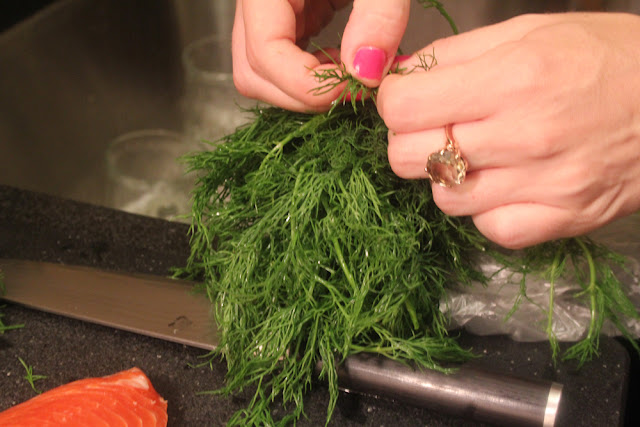 |
| Image courtesy of sunset.com |
While I may have been a little overly dramatic in my affection and clueless in my assessment, I was certainly onto something. Not only does it taste great, but salmon is so good for your body. The American Heart Association agrees with me. They recommend eating fish, specifically fatty fish such as salmon, two times a week.
Here's why you should incorporate salmon into your diet...
PROTEIN PACKED - Salmon has an extremely high protein content (over half of your day's requirement in just one 4 oz. filet). Protein is needed for muscle maintenance and repair.
FULL OF OMEGA-3'S - Omega-3 fatty acids (which your body cannot produce on it's own) play a vital part in lowering your blood pressure and cholesterol and are necessary for optimal heart health. Omega-3's also ensure healthy joints and skin.
RICH IN VITAMINS AND MINERALS - Your whole daily requirement for vitamin D (which helps boost your immune system) is met by eating just one 4 oz. filet. Salmon is also a great source of iodine (which protects the brain from toxins and assists in metabolic functions) and selenium (which protects your cells from free radical damage).
The Omega-3's, combined with the presence of vitamins and minerals, do wonders for your body. Eating salmon can reduce your risk of diabetes, help protect you from osteoporosis, reduce inflammation in the body caused by rheumatoid arthritis and other diseases and also help with neurological development in infants (when expecting mothers consume salmon in the first stage of pregnancy).
Now to the business of buying salmon. There are many different types out there. Atlantic salmon tends to be farm-raised; whereas, Pacific salmon is usually wild. Wild is preferable whenever possible because farm-raised salmon have extremely high levels of PCBs, which are toxic man-made chemicals. Farm-raised salmon also contain lower levels of Omega-3's because of the way the fish are fed. Wild salmon can cost significantly more (up to $10 difference at times), but if you eat salmon frequently, you should try to buy it whenever possible.
With no further ado, here's my mother's easy 'go-to' recipe for Baked Salmon With Lemon Pepper and Dill. Drumroll please...
 |
| Preheat the oven to 400 degrees. Lightly coat the salmon with olive oil (the original recipe uses mayo, but I prefer olive oil). |
 |
| Zest the outside of 2 large lemons, then cut the lemons in half and save for later. |
 |
| Wash the dill and pick off a small handful of the sprigs. |
 |
| Add a heavy coating of the zest to the top of the filets. Then squeeze some lemon juice on both pieces for extra flavor. |
 |
| Now enjoy your heart healthy and easy meal! Thanks, mom! |
Here are a few more recipe ideas to get you started...
CASHEW SALMON WITH APRICOT COUSCOUS:
http://www.eatingwell.com/recipes/cashew_salmon_with_apricot_couscous.html
 |
| Image courtesy of eatingwell.com |
MARINATED SALMON WITH MANGO-KIWI RELISH:
http://www.myrecipes.com/recipe/marinated-salmon-with-mango-kiwi-relish-10000000592358/
 |
| Image courtesy of myrecipes.com |








No comments:
Post a Comment